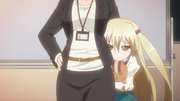Review for When Supernatural Battles Became Commonplace - Complete Season Collection
Introduction
Have you ever noticed how superheroes are always tested? In all of the comic books and the movies, unsuspecting people might have amazing powers thrust upon them, the community minded will wind up fighting crime, and a suitably powerful foe will arise to test those abilities beyond their limits. That is narrative destiny. We expect Superman to face Zod, Batman to face the Joker. But what if people got superpowers in a mundane world, with no crime to fight, no villains to defeat, what if their toughest challenge was going to school? It doesn’t sound much like a premise, but that is what happens in When Supernatural Battles Became Commonplace.
It was just a normal day in the Literature Club, Chunibyo Jurai Ando was holding forth on his ‘innate’ superpowers, listened to in amused tolerance by club members Tomoyo Kanzaki, Hatoko Kushikawa, and Sayumi Takanashi, as well as their teacher’s niece Chifuyu Himeki, when it actually happens. There’s a flash of light, and suddenly all five of them have super-powers.
Six months later and not much has changed. They still go to school; they still attend the Literature Club, although club meetings are certainly more colourful, given their abilities. Ando has applied his Chunibyo naming sense to them. Chifuyu has World Create, and she can create anything in matter, energy or space. Hatoko has Over Element, control over earth, air, water, light, and fire. Tomoyo has Closed Clock, the ability to freeze or slow down time. Sayumi has Root of Origin, the ability to restore anything damaged, anyone injured to their original state. And Ando has Dark of Dark, the ability to produce lukewarm black flames from his hand. He may have been short-changed in the power department, but he more than makes up for it in enthusiasm. The group have been keeping their powers secret, and just using them for goofing around after school. But there have been complaints about the Lit Club, especially the noise, and the Student Council President pulls a surprise inspection. The real surprise is that she’s got powers too.
Twelve episodes are presented across two Blu-ray discs from Manga Entertainment. The show is also available on DVD.
Disc 1
1. Alpha Episode
2. Misconception
3. Rendezvous Point
4. Capricious Lady
5. Sensitive Age
6. Vice Penalty
7. Juggernaut On
8. Holmgang Battle
9. Girls Approach
Disc 2
10. Fool’s Labyrinth
11. Cupid Error
12. Usual Days
Picture
Just as you’d expect, the image is given a 1.78:1 widescreen 1080p transfer on these discs. It’s clear and sharp, with strong, consistent colours, and a minimum of digital banding visible on screen. This is hardly the release to court such artefacts though, as it keeps its animation bright and colourful, and despite the super-powered action, there’s hardly the dark moodiness or complex animation to warrant banding. The animation is smooth throughout, the world design is pleasant enough, and the character designs conform to the cute, appealing mainstream of modern anime. One oddity was a deliberate softness to scenes set in the middle distance, a comparative lack of detail. It doesn’t happen in every such scene, but it happens often enough to warrant comment. It appears to be a stylistic choice but it does feel a little odd at times.
The images in this review have been kindly supplied by Manga Entertainment.
Sound
You have the choice between DTS-HD MA 2.0 Stereo English and Japanese, with subtitles and signs locked to the appropriate track. This is one of those shows where the original language audio is by far the preferable option, as Sentai’s dub is one of those rough and ready, hastily put together affairs with little thought to casting and performances. At least that’s what I got with my brief acquaintance with it, the elementary schoolgirl Kuki sounding like a 40-year-old chain smoker... The Japanese is by far the better track, with actors suited to their roles, and performances up to a common standard. They at least sound as if they are all in the same show. That said the character voices do conform to the usual stereotypes, the tsundere, the childhood friend, the motherly friend, the cute, emotionless kid and so on. The subtitles are timed accurately and are free of typographical error.
Extras
The discs present their content with static menus, and each episode is followed by a translated English credit reel.
The sole extras on disc 2 amount to two textless openings, one textless closing, and trailers for Love, Chunibyo & Other Delusions, Magical Warfare, Wizard Barristers, and Blade Dance of the Elementalers.
Conclusion
Once in a while, you get a show or a movie that is the definitive word on a subject. You will feel after watching it that the topic is done, no more needed, put it to bed. It’s especially infuriating for creators when it happens the first time at bat, as they can probably see dollar signs in creating a genre. That’s what happened with the Chunibyo phenomenon, the delusions of childhood lasting a little too long into adolescence. The first show I saw dealing with the subject, Love, Chunibyo & Other Delusions is the best that you can get. It was a perfect ten the first time out, and anything similar I have seen since, including its own sequel has fallen short. When Supernatural Battles Became Commonplace has a chunibyo as its central male character, and it plays with the themes through its run. And it falls short too.
Falling short is no guarantee of mediocrity though; this might still be a good show, but When Supernatural Battles Became Commonplace has other problems as well that keep it from shining. For one thing, it lacks the strength of its own convictions. That is a particular bugbear of mine; when shows change their premise halfway through. Sometimes it’s deliberate, sometimes it’s a kneejerk response to fan feedback, very rarely does it succeed, and even if it does, you can bet that someone who fell in love with the original premise will feel betrayed by the change. I might have discovered the Dragon Ball franchise in the wrong order, and years after the fact, but the original Dragon Ball was actually a gag manga, going for the comedy jugular first and foremost. It took a few chapters in before Akira Toriyama made the genre shift to fighting tournament, and the rest is history.
When Supernatural Battles Became Commonplace has as its premise a world where teenagers mysteriously get superpowers, but have no particular need for them; the most they can do with them is fool around. There are no villains to be defeated; no one particularly needs their life saving, so what this show begins as is really a slice of life show with added super abilities. The five members of the Literature Club, (plus the Student Council President Kudo as they later learn) get gifted super abilities, with no rhyme, reason or explanation. That’s development enough to have anyone freaking out, but for Chunibyo Ando Jurai, it’s his wildest dreams come true, and his enthusiasm is infectious. He’s largely in part responsible for his friends accepting their own powers, and he helps them understand how they should, and should not be using them. The after school Literature Club soon becomes after school superpower training, but given the powers that the girls have, it’s also a whole lot of fun.
The first half of the show is really a fun piece of entertainment, with stories like Ando coming up with suitable superhero nicknames, a letter that he writes to Kudo being misinterpreted, Tomoyo’s big brother showing up, and turning out to be a bigger Chunibyo than Ando, Chifuyu’s best friend from elementary school turning out to be jealous of her Literature Club friends and so on and so forth. It’s a nice mix of entertaining comedy and character drama, and it unfolds at a nice gentle pace. I would have loved it if the show had stuck to its guns and played out this way, but around episode 7, they decide that the powers need some explanation, and they need a wodge load of exposition, so enter a whole other batch of super-powered characters, all engaged in the Fairy War! It’s actually not very interesting, a kind of battle anime unfolding in the background of the slice of life show, and it’s only when they impinge on the main characters that they have relevance, although if you’re like me, you’ll probably resent the interruption rather than appreciate the broadening of the story.
The second problem is that for the final four episodes, the show turns into a harem anime. It’s not even a harem comedy. Basically if the character is female, has a pulse, then she will fall in love with Ando. All of the girls in the Literature Club fall for him, Kudo does, and so does Chifuyu’s friend Kuki. Tomoyo’s always been tsundere about him, but Chifuyu and Kuki go on a ‘date’ with him to the local pool, then Hatoko spends a day trying to confess her love for him on the beach, while the other faction shows up again, playing with Sayumi’s feelings for Ando.
When Supernatural Battles Became Commonplace feels like three shows squeezed into one, and it becomes a bit of a mess as a result. Fortunately the mess doesn’t become apparent until after the halfway point, and the show has built up enough momentum to keep it moving to the end, to hold the audience interest despite its shortcomings. It’s not a bad show, but it would have been a lot better if it had just stuck with that original premise.







































































Your Opinions and Comments
Be the first to post a comment!